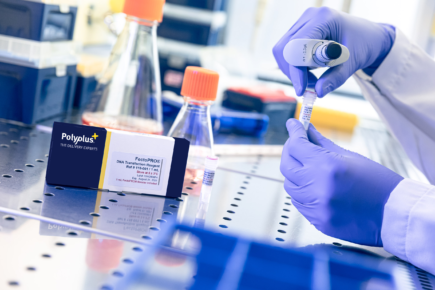FectoPRO is a transfection reagent specifically optimized for transient protein and antibody expression in CHO and HEK293 cells.

We use cookies to help you navigate efficiently and perform certain functions. You will find detailed information about all cookies under each consent category below.
The cookies that are categorized as "Necessary" are stored on your browser as they are essential for enabling the basic functionalities of the site. ...
Necessary cookies are required to enable the basic features of this site, such as providing secure log-in or adjusting your consent preferences. These cookies do not store any personally identifiable data.
Functional cookies help perform certain functionalities like sharing the content of the website on social media platforms, collecting feedback, and other third-party features.
Analytical cookies are used to understand how visitors interact with the website. These cookies help provide information on metrics such as the number of visitors, bounce rate, traffic source, etc.
Advertisement cookies are used to provide visitors with customized advertisements based on the pages you visited previously and to analyze the effectiveness of the ad campaigns.
Meet our Team at our booth #409 during Peptalk, in San Diego, January,17-19, 2022!
Ashlee Sun, Mathieu Porte, Mégane Denu, Marine Ricordel, Jonathan Havard, Coralie Stritt, Yann Philipson, Malik Hellal, Patrick Erbacher
The number of ATMP therapeutic-based medicines for inherited genetic disorders is in constant growth, with a global 32% increasein new clinical trials in the last 4 years. ATMPs have demonstrated their success with already more than ten approved for commercialization. The success of AAV as the most promising viral vector for gene therapy is due to low immunogenicity, broad tropism and non-integrating properties. One major challenge for translation of promising research to clinical development is the manufacture of sufficient quantities of AAV. Transient transfection of suspension cells is the most commonly usedproduction platform, as it offers significant flexibility for cell and gene therapy development. However, this method presents some limitations in largescale bioreactors: inadequate transfection protocol, reduced transfection efficiency and lower productivity. To address this concern, we present data on a novel transfection reagent showing: i) increased AAV titers, ii) Cost-effectiveness with reduced cost per dose for therapy affordability, iii) improved transfection protocol for large scale bioreactors and iv) reproducibility of viral titers at different production scale. Withour continuous commitment in supporting CGT manufacturers, FectoVIR®-AAV is available at GMP grade, the highest quality grade for ancillary materials aligned with quality standards recommended by health authoritiestoensure patient safety.
Ashlee Sun, Mathieu Porte, Jonathan Havard, Valérie Moreau, Fabrice Stock, Patrick Erbacher
Development process for biotherapeutic protein production usually begins with generating a high-performing stable cell line which can be used for manufacturing. As this step takes a lot of time, transient transfection offers a great alternative to quickly produce milligram to gram quantities of recombinant proteins and antibodies. A various number of culture media are available for performing transient protein production in both CHO and HEK cells, but the limiting factor often remains the transfection reagent. Therefore, Polyplus-transfection has developed a novel technologically advanced transfection solution named FectoPRO®. Here we show that FectoPRO® outperforms currently available PEI-based and lipid-based transfection reagents in all the transient expression systems tested, offering great transfection efficiency and amazing protein yields.